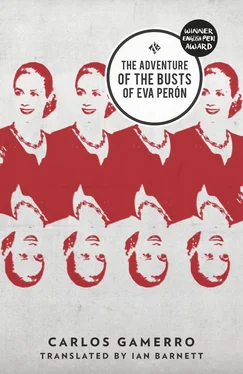‘We’re getting there, we’re getting there. We’re getting some positive energy now. Well then, yellow hat: what do you say? Shall we give it a go?’
The question was a loaded one: up until now Baigorria had been the staunchest opponent of the occupation. Would he be capable of playing along and seeing things from the other side?’
‘Well, if you ask me, comrades,’ began Baigorria, all nonchalance, ‘I reckon things are going brilliantly. Get a load of old Sr Sansimón there, how contented he looks. Lean over the wire fence and give our old friend Plod a wave. They’re so busy looking after us they wouldn’t leave their post, not for hot pizza. What I reckon, comrades, is that they won’t just grant us all our demands, but a whole lot more, so let’s get asking: a twenty-hour week, three months’ paid holidays, four meals and a siesta with an optional slag thrown in for anyone who isn’t feeling sleepy…’
Some celebrated his wit; others booed him. But the fact was that, irony apart, Baigorria had understood perfectly how the game worked. Garaguso’s influence had awoken in this once apathetic and unimaginative man latent qualities of leadership. He could be an adversary to be reckoned with if you got on the wrong side of him.
‘Now,’ said Marroné, rubbing his hands contentedly, ‘let’s hear the other side. The black hat.’
Saturnino contemplated his former partying companion with a wicked look in his eye.
‘All I’ve got to say is that, if we don’t lift the occupation soon, they’ll blow us to kingdom come and we’ll lose everything we’ve gained so far. The government was listening to us at first: sent us a representative and two big mouths from the Ministry of Labour they did, and now they won’t even answer the phone. They’re calling us anarchists and communists on the radio, and saying we’re full of infiltrators and subversives. Any night now they’re going to throw everything they’ve got at us, and if the police don’t succeed, the army will. At best we’ll all be sacked; at worst we’ll all get whacked.’
The audience’s response was instantaneous. ‘Coward! Traitor! Sell-out!’ And that wasn’t all they said.
‘Just a moment, just a moment!’ mediated Marroné. ‘Sounds like you’re all doing the job of our comrade in the brown hat.’
‘The fact is that you’ve sold out to the management,’ El Tuerto lashed out at Saturnino without warning. ‘You and that one,’ he said, roping in Baigorria with a flick of his finger, ‘are traitors to the workers’ movement.’
‘Me? A traitor? Say that again if you’ve got it in you!’ said Saturnino, working himself into a lather and advancing, fists clenched, on his colleague, who puffed out his chest (or rather his belly); had the others not restrained them, the fists would have flown. Far from daunted, Marroné decided the time had come to up the ante.
‘All right, all right. Now you’ll really see what this game’s about. Change hats.’
The two of them stood and gaped at him.
‘You heard me: Saturnino, you take the brown one, and El Tuerto, you put on the black one.’
This time they complied. But they went no further.
‘And?’
‘Fucking arsehole,’ the now brown-hatted Saturnino spat at El Tuerto.
‘You’ll come to a bad end you will, sonny,’ reacted El Tuerto, after donning the black hat, then, including the audience with an arc of his finger, ‘so’ll you lot.’
Even El Tuerto and Saturnino ended up joining in with the general cackling that ensued, then they both shook hands, and everyone cheered. They’d got the idea: the exercise was turning out to be a triumph. The positions were nothing more than that — positions; their identities weren’t involved; they could change them as easily as putting on and taking off a hat. And this was just the start. Leaving behind their fixed roles and seeing things from the other’s point of view were steps that led up to the game’s ultimate goal: opening the doors to the green-hat proposals; finding new, creative solutions to old problems. Even Paddy now looked at him differently. Marroné felt a secret warmth run through him.
‘Well, now it’s time to open the game up a bit. Anyone who wants to say something can come up, or speak from where they’re standing. But before you speak, just make quite sure you’ve thought about what you’re going to say and that you’ve got the right hat on.’
Several hands in the audience went up. One of them belonged to Sansimón Senior, who had been whispering throughout with the young sculptor from his workshop. Marroné decided to risk it and invited him up.
‘Which hat, comrade?’
‘White,’ said the old man.
The workers regarded him with curiosity, though without hostility; his son’s face, however, was contorted with suspicion. The old man studied the array of coloured helmets at his feet like a seabed covered with coloured snails. Then he spoke:
‘I’ve chosen the white one because it’s the information hat, and I’ve got something new to tell you. You all know that, when I founded the Sansimón Plasterworks, I was just like you. It was just a little workshop in a house in Constitución: there were three assistants and myself, and the four of us did everything. Then, thanks to God and the hard work of the people, we started growing, until we became what we are today. The current CEO, who is here with us today, claims he was the one who built this great company from its humble origins, but that’s his way of looking at things. I know that the reality is very different. I know that the ones who made the Sansimón Plasterworks what it is today are you — all of you.’
His first pause was filled with a general ovation. The old man could certainly deliver a speech, that was for sure.
‘The CEO’s chair isn’t a throne,’ he went on once there was silence again, ‘and a factory isn’t a kingdom handed down automatically from father to son. When I saw that the time had come to step aside and leave the leadership in more capable hands, I had a very different idea of how the company should be run. In my youth I read Proudhon, Bakunin, Kropotkin — and this hand shook the right hand of the Spanish Civil War hero, Buenaventura Durruti… I learnt a lot of things back then… That man must not be a wolf to man, that dignity is worth more than a full stomach…’
Marroné was beginning to get impatient: if the old man started banging on about his socialist past, all that he’d accomplished so far would fly out of the window. Just then he spotted the young sculptor wading through the sea of comrades waving a sheaf of papers over his head, and when he noticed old Sansimón Senior’s smile, Marroné understood it had all been just a ruse to buy some time.
‘Most of all I learnt that the land has to belong to the peasant who works it and the factory to the worker!’ declared the old man, stretching out a hand to take the papers his assistant held out to him. ‘And here’s the proof!’ he exclaimed, bearing them aloft and letting them flutter in the breeze. ‘These documents prove that I’d decided to hand the factory over to all of you! And this exploiter — this fruit of my loins! — who only the virtue of his poor mother prevents me from calling something else, had me legally declared mentally unsound, presenting these papers here as proof! Only a madman, argued his lawyers to a judge he’d bought off, would want to give his factory away to his workers.’
Marroné couldn’t believe his ears. It was as if the will scene from Julius Caesar were playing out before his eyes. But then again, in the world of applied creativity, stranger things than this happened every day. Once the floodgates were open, it was impossible to predict what might pour out of them.
Читать дальше











